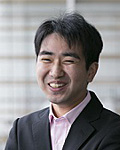Ultra-flexible Organic Electronics
Category
Published on
Abstract
Flexible electronics is promising to realize bio medical application due to, among other factors, their flexibility and conformability. To improve these characteristics, reducing the thickness of the device is very effective. We have developed ultra-flexible and lightweight organic electronics and photonics devices, including transistors, biopotential sensors, and light absorbing and emitting devices, that are just few microns thin including the substrates. I will present the application of our ultra-flexible organic electronics.
Bio
 Tomoyuki Yokota was born in Tochigi prefecture, Japan in 1985. He received B.S., M.S., and Ph.D. degrees in applied physics from the University of Tokyo, Japan, in 2008, 2010, and 2013, respectively. From 2013 to 2016, he was an Assistant Professor with the Department of Electrical and Electronic Engineering, the University of Tokyo. Since 2016, he has been a Lecture with the Department of Electrical and Electronic Engineering at the University of Tokyo. His research interests include printed electronics, large-area electronics, and organic electronics.
Tomoyuki Yokota was born in Tochigi prefecture, Japan in 1985. He received B.S., M.S., and Ph.D. degrees in applied physics from the University of Tokyo, Japan, in 2008, 2010, and 2013, respectively. From 2013 to 2016, he was an Assistant Professor with the Department of Electrical and Electronic Engineering, the University of Tokyo. Since 2016, he has been a Lecture with the Department of Electrical and Electronic Engineering at the University of Tokyo. His research interests include printed electronics, large-area electronics, and organic electronics.
Sponsored by
Cite this work
Researchers should cite this work as follows: